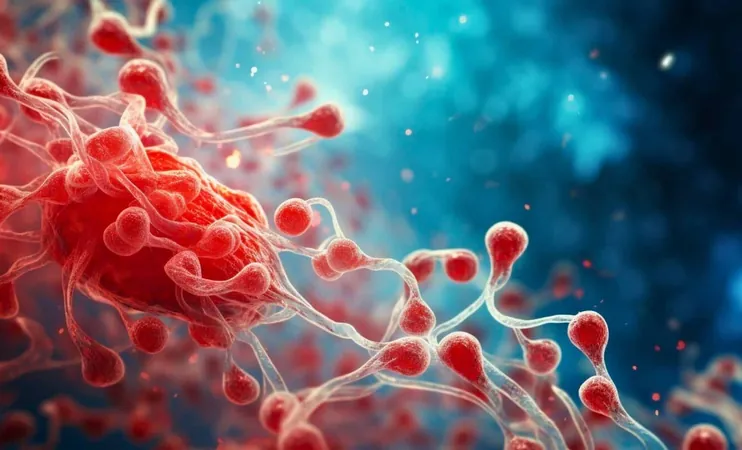
Scientists Unveil Groundbreaking Protein That Could Hold the Key to ‘Reversing Aging’! 🧬
2024-12-19
Author: Ming
In an exciting discovery, researchers from McMaster University in Canada have pinpointed a crucial protein named Mesencephalic Astrocyte-derived Neurotrophic Factor (MANF) that could revolutionize our understanding of aging. This protein plays a significant role in maintaining cellular health by rectifying protein imbalances that are often at the heart of aging and neurodegenerative diseases such as Alzheimer's and Parkinson’s. The implications for humanity could be enormous!
The Mystery of Protein Homeostasis
At the core of cellular function lies the protein homeostasis – a biological process that governs how proteins are produced, folded, and eliminated. For our cells to function optimally, this balance is vital. Any disruption in this process can lead to the accumulation of misfolded proteins, a situation that triggers cellular stress and damage.
Key components that contribute to this equilibrium include: - **Protein Folding**: Molecular chaperones assist in ensuring protein functionality. - **Degradation Systems**: Damaged proteins are effectively broken down by the ubiquitin-proteasome system or lysosomes. - **Aggregate Clearance**: Autophagy plays a pivotal role in removing toxic clusters of misfolded proteins.
As we age, these systems become less efficient, resulting in toxic buildups that can significantly impair cellular function and are linked to severe conditions like Alzheimer's and Parkinson's diseases. However, MANF might be the key to restoring this crucial balance.
How MANF Tackles Cellular Stress
The study reveals that MANF demonstrates a remarkable ability to alleviate endoplasmic reticulum (ER) stress, which is a primary contributor to protein misfolding and age-related decline. Normally responsible for protein synthesis and folding, the ER can become overloaded with misfolded proteins, potentially leading to cell death. MANF steps in by: - **Enhancing protein clearance**: Boosting autophagy to eliminate harmful misfolded proteins. - **Restoring cellular functions**: Re-establishing equilibrium within the ER to reduce stress. - **Protecting cellular integrity**: Shielding cells from damage triggered by chronic stress.
Remarkably, experiments using the model organism Caenorhabditis elegans (C. elegans) revealed astonishing results: increasing levels of MANF reduced protein aggregates and extended lifespan by an impressive 20-25%! This underscores MANF's potential not just for cellular health but also for extending longevity.
Revolutionary Medical Applications
Given MANF’s promise in combating protein stress, it opens up new pathways for treating debilitating neurodegenerative diseases. Its therapeutic potential could lead to: - **Eliminating toxic protein aggregates**: Targeting the harmful protein buildups associated with conditions like Alzheimer’s and Parkinson’s. - **Innovative anti-aging treatments**: Supporting our cellular systems to enhance resilience against the ravages of time.
This discovery places MANF at the forefront of regenerative medicine, shifting the focus from merely addressing symptoms to restoring and maintaining robust cellular function.
What’s Next for Research?
While the outcomes in C. elegans are significant, essential work lies ahead to translate these findings into human applications. Researchers are prioritizing: - **Mammal testing**: Assessing MANF’s safety and efficacy in complex biological systems. - **Molecular interaction understanding**: Elucidating how MANF cooperates with other proteins for maximum protective impact. - **Innovative delivery methods**: Developing gene therapy and nanoparticle systems to effectively introduce MANF into human cells.
These critical steps will pave the way for the safe and effective application of MANF in clinical settings, with the potential to change lives on a monumental scale.
This groundbreaking research not only illuminates a fascinating aspect of aging but could rewrite the rules of health and longevity for generations to come. Stay tuned for more updates as the science unfolds!
 Brasil (PT)
Brasil (PT)
 Canada (EN)
Canada (EN)
 Chile (ES)
Chile (ES)
 España (ES)
España (ES)
 France (FR)
France (FR)
 Hong Kong (EN)
Hong Kong (EN)
 Italia (IT)
Italia (IT)
 日本 (JA)
日本 (JA)
 Magyarország (HU)
Magyarország (HU)
 Norge (NO)
Norge (NO)
 Polska (PL)
Polska (PL)
 Schweiz (DE)
Schweiz (DE)
 Singapore (EN)
Singapore (EN)
 Sverige (SV)
Sverige (SV)
 Suomi (FI)
Suomi (FI)
 Türkiye (TR)
Türkiye (TR)